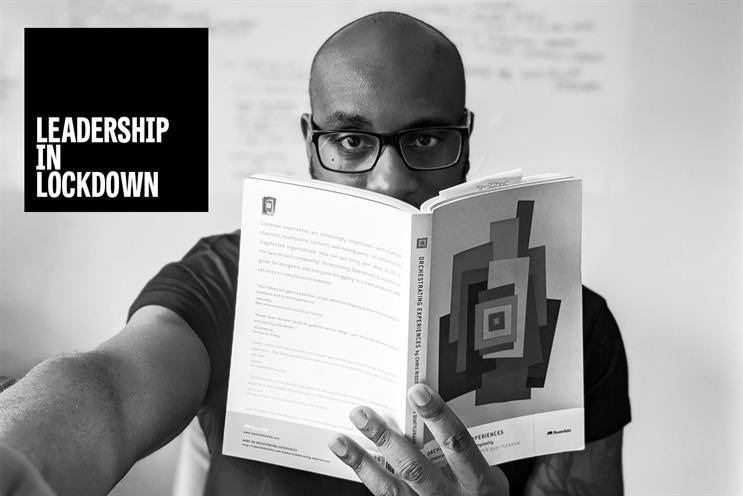
The lockdown is a challenge for everyone. Agencies have had to change the way they work, be it pitching for new business, presenting work to clients or just catching up with the team. Add to that the closure of schools, many people are also having to juggle childcare/home schooling.
So how are some of adland's leaders coping in the lockdown? First up is Ete Davies, chief executive of Engine Creative.
Where are you spending quarantine and how do you run your day?
I'm at home with my family. The days are longer than usual (early starts and late nights), with the challenge of being a parent, teacher and chief executive simultaneously. Each day is a little different, but most mornings being spent in Zoom meetings with our teams and clients are a constant.
What were the biggest adjustments that you had to make in the first few weeks in terms of your work, your team and your clients/external partners?
At Engine, we'd moved to fluid working a number of months before the nationwide quarantine, encouraging people to work remotely when it made sense, with everyone having access to a laptop, Zoom, Slack and so on.
So our internal adjustment was relatively quick and smooth, as we'd already developed the infrastructure and organisational behaviours for remote working, especially internal collaboration.
However, creative reviews with clients and pitches through Zoom have taken a little adjustment – we've had to quickly adapt how we prep and conduct these sessions. In doing so, we've gained learnings that will improve how we do these post-quarantine.
How has your business made savings and why have you chosen certain routes?
Like most responsible businesses, we've been taking all necessary measures to manage our costs against the fluctuations in revenue to ensure we're able to operate efficiently through this challenging time and afterwards, and protect the jobs of as many of our employees as we can in the long term.
We've reduced all discretionary costs. Our executive and senior leaders have also volunteered a 20% pay cut for the coming three months. We're also availing ourselves of the government’s job retention scheme to furlough staff where our work pipeline has reduced, but we’ve also enhanced this scheme with additional funds from Engine to lessen the financial impact on employees.
What has been the hardest part and what has been the most uplifting part of lockdown?
I'm still relatively new to Engine [Davies joined in September 2019] and so as a new leader the first year is typically all about building momentum, culture and belief. Understandably, there has been a bit of setback to building momentum, so the hardest part has been having to rebuild that momentum with a distributed workforce – inculcating transparent communication and open collaboration has been a key part of rebuilding that momentum.
As such, I've been most uplifted by how our agency has responded, rallying together, taking care of our people, still pushing towards our ambition and not "dropping a beat" when it comes to servicing our clients and helping the wider community. Our recent work for Women's Aid and Jägermeister are both great examples of this.
What are you working on?
Like most of us, trying to understand the medium- and long-term view on how our business, industry and wider world will be affected by this event. Especially in the next six months (in a post-quarantine, social-distancing world) and into 2021, when we're in whatever the "new normal" is.
So lots of planning on how we can best help and service our clients, support our people and also provide some positive wider contribution. William Lidstone (our chief growth officer) and I are currently developing a "recovery roadmap" service to help our clients navigate a post-quarantine, social-distanced environment.
How do you find inspiration?
The extra hours that I've been able to get back (from not commuting) have been useful to squeeze in time for listening to podcasts, researching, reading, speaking to clients and learning about how other sectors are responding. Also, mentoring sessions with both mentors and mentees.
Has the experience taught you something that you’ll change when you get back to working from an office?
It's not so much taught as reaffirmed my belief that future-proofed organisations need fluidity and flexibility built into the core of their working practices and that being set up to enable remote working is business critical. When we’re all back in the office, I'd like to ensure we continue to enable this and try to continually improve how we can be even more effective and accommodating for fluid working.
What change do you expect to see in the industry when this is over?
Coronavirus has significantly disrupted how we work, engage with our clients and also the type of work we make. It's led to more agility, inventiveness and collaboration. I'm not sure there'll be a situation where we can use the phrase "this is over", but when we do move to whatever becomes the norm, I'd like to see our industry continue with the mindset and behaviours that have spurned all this innovation.
Such as more co-creation and collaboration with clients during the creative process. New models of production that are more agile, efficient and experimental. More flexibility and fluidity in how we work and more work where brands, driven by purpose, are authentically connecting their behaviour and belief – to help customers as well as sell products.



.jpg)
.jpeg)
